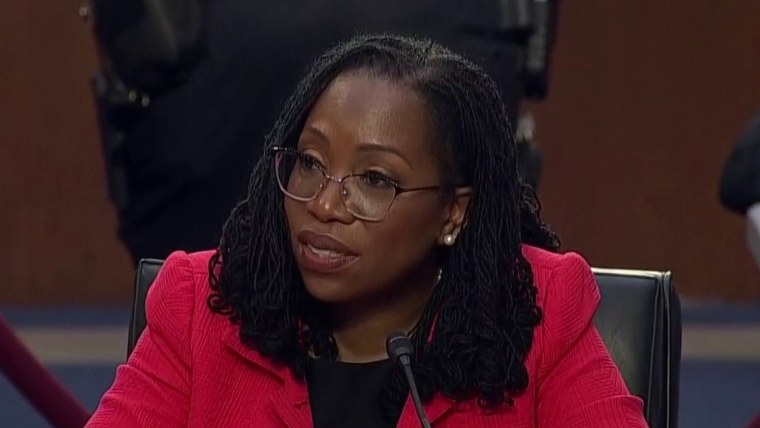WASHINGTON — Judge Ketanji Brown Jackson appeared Tuesday for what may end up being the most important day of her Supreme Court confirmation hearings, taking questions from senators during a marathon session before the Judiciary Committee.
The questioning began with Judiciary Committee Chair Dick Durbin, D-Ill., and ranking member Chuck Grassley, R-Iowa, with 30 minutes allotted to each of the panel’s 22 members. The last two senators will pose their questions Wednesday morning.
Here are some of the highlights and revelations from Tuesday’s hearing.
Jackson rejects labels, vows ‘impartiality’
Jackson, a member of the U.S. Circuit Court of Appeals for Washington, D.C., said she was “reluctant” to apply labels such as “originalism” and “living Constitution” to capture her judicial philosophy, saying that the Constitution is “fixed in its meaning” but that sometimes, judges need to also look at history, structure and circumstances alongside the original intent of a statute.
One word Jackson repeatedly returned to was “impartiality” as she discussed her method of ruling on cases as a judge.
“I am not importing my personal views or policy preferences. The entire exercise is about trying to understand what those who created this policy or this law intended,” she told Durbin in the first moments of the hearing.
Later, when Sen. Patrick Leahy, D-Vt., asked about her experiences as a public defender and vice chair of the U.S. Sentencing Commission, Jackson said her various positions taught her about “impartiality” and “staying in my lane as a judge.”
“Because I saw the different roles, I think I have a good appreciation of what it means to be a judge,” she said.
GOP tactics on display
Some GOP senators reached for red meat issues for the base.
Sen. Ted Cruz, R-Texas, pressed Jackson about The New York Times’ “1619 Project” and critical race theory and her views on it. “It doesn’t come up in my work as a judge. It’s never something that I’ve studied or relied on,” she replied. “And it wouldn’t be something that I would rely on if I was on the Supreme Court.”
Cruz asked Jackson about the book “Antiracist Baby” by Ibram Kendi — and whether she believes “babies are racist.”
“I do not believe any child should be made to feel that they’re racist or that they are not valued or that they are less than, that they’re victims or that they are oppressors,” she replied.
In a tense set of questions, Cruz pushed Jackson about her sentencing record in child pornography cases, with charts comparing her punishments to officers’ recommendations. He pressed her about the meaning of civil rights leader Martin Luther King Jr.’s words.
Sen. Josh Hawley, R-Mo., focused all of his questioning on child pornography cases and sought to depict Jackson as too lenient against defendants. She appeared visibly frustrated as she sought to explain her role in sentencing.
“It is heinous. It is egregious,” she said of the crimes. “What a judge has to do is determine how to sentence defendants proportionally consistent with the elements that the statutes include, with the requirements that Congress has set forward.”
Hawley said: “I am questioning your discretion and your judgment.”
Posting on Twitter during Hawley’s questioning, White House spokesman Andrew Bates called his claims a “QAnon-signaling smear,” referring to the extreme-right conspiracy group.





Leave a Reply